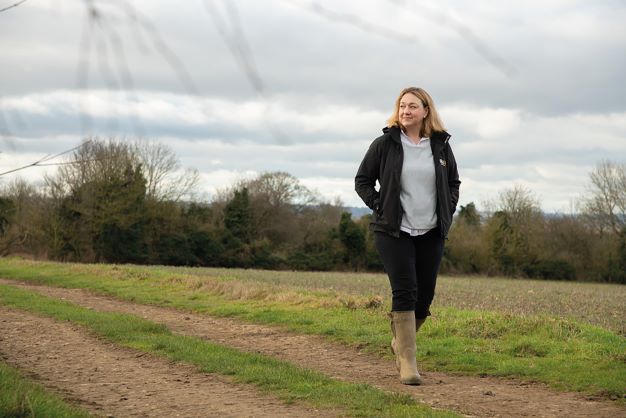With mounting pressures facing farm sector workers, mental health concerns are higher than ever. Fortunately, a suite of services is being offered by RABI as poultry farmers are encouraged to seek out support
Last year, agricultural charity RABI’s Big Farming Survey indicated that mental health is a fundamental issue among farmers in England and Wales. Earlier this year, evidence from the 1.5 million data points garnered through that research led to the introduction of new support services from the charity.
“Our ground-breaking Big Farming Survey shone a light on the immense scale of pressures and stresses that farmers face, and for the first time evidenced the strong link between the financial health of farming businesses and the wellbeing of the farmers and their families operating them,” explains Suzy Deeley, the head of partnerships at RABI, who also has family ties to the poultry industry.
“The survey findings confirmed that over a third of farming people in England and Wales are probably or possibly depressed, with livestock farmers among those most at risk of poor mental wellbeing.”
The risk of disease outbreak, on top of rising input costs, payment and policy changes and labour challenges, continues to bring increased uncertainty for poultry producers. Inevitably, these factors are having a detrimental effect on farmers’ mental health in the sector, she explains.
“Within the poultry sector, 40% of our survey respondents named regulation, compliance and inspection as one of the most important stressors, with the Covid-19 pandemic and the future of their farm cited as two other key concerns,” she adds.
“If a farming business is facing increased financial risk, it’s very unlikely that a farmer’s wellbeing won’t be impacted negatively.”
In response to the Big Farming Survey findings, RABI launched professionally led support services in January this year, including free, confidential in-person counselling.
“To complement our existing support, RABI is committed to developing services that are focused on providing early, preventative wellbeing support for farming people,” Deeley says. “A mix of our highly trained and experienced team and partnerships with specialist service providers means we can provide access to localised professional support, which is tailored to individuals.
“When we launched our in-person counselling service earlier in the year, we endeavoured to make the referrals process as straightforward and comfortable as possible.
“The first step in improving farmer wellbeing is to have that important initial conversation, which is why we’re encouraging and empowering people to reach out for support earlier.”
VIEW FROM THE POULTRY FARM
Roger (not his real name), from Shropshire, runs a free-range egg business and has experienced first-hand some of the pressures highlighted in the RABI report.
“In the last 60 years we’ve expanded our egg production considerably, adapting to constant sector challenges to maintain our income. My parents built up the business, with poultry farming at the centre. Now we have 48,000 free-range laying hens within a mixed farming enterprise, with three generations of the family working on the farm full-time,” he explains.
“Often it feels like we are surrounded by stressful challenges, which bring an ever-bigger risk for poultry businesses and our livelihoods. Over the years, we’ve learnt that we’re always t the mercy of our customer,
and had to start marketing our end produce again from scratch in the mid-1980s when our sole customer shut down. We now sell half of our eggs on contract to a large retailer and supply the other half directly to a number of smaller shops more locally, which means we have more customers to manage, but the risk of losing an outlet is more manageable, and we have income coming in all year round.
“As more and more noughts seem to be added to our input costs, maintaining cash flow is even more important. For example, the cost of our hen feed has risen 40% since last spring. Compared to the minimal price inflation of our end product, it feels like we’ve been left behind and are continually squeezed in the middle,” Roger adds.
“Recently, the threat of avian flu, and the impact an outbreak could have on our business, has been very worrying. Being forced to adapt usual routines to house birds, putting in extra biosecurity measures, on top of the incredibly stringent processes we have already, is all additional work. The process of getting a licence to bring in new pullets has been made even more complicated by the restrictions too.”
“Poultry farming used to be a more physically demanding career, but now there’s as much paperwork involved in poultry farming as there is looking after your livestock. It’s definitely the most stressful aspect,” Roger explains. “We’re lucky that we can share the different compliance workloads between family members, but it doesn’t feel as if there’s enough appreciation from the public for everything that has to be done to get eggs to the shop shelves.
“If any poultry farmers are feeling under pressure, there is always support out there. It always helps to get another perspective on the challenges you’re facing. On our farm, sharing the workload among the family is so important. Not only does it help to share the burden of stress, but it also means we can take it in turns to have time off.
“Giving your mind a couple of hours break from the farm workload, chatting to a mate and sharing the battles you face, helps to air out your problems and get them off your chest. If anyone is wondering where to go to, bottling things up, don’t leave it too late. When you talk about things, it puts your problems in perspective and can be a big help.”
FINDING SUPPORT
If you, or anyone you know, could benefit from talking to a professional, support is available. The first step is to call RABI’s free, confidential 24/7 helpline on 0800 188 4444. Support is also available via RABI’s free online wellbeing platform: www.qwell.io/rabi


